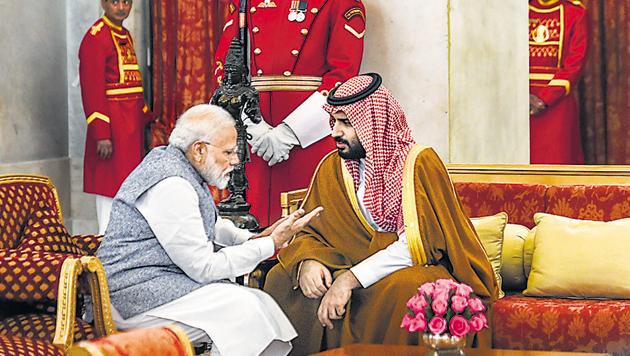India-Saudi Arabia relations cannot be Pakistan-centric
The Narendra Modi government did well not to succumb to the anger of the moment and put an important relationship in jeopardy
The visit of the crown prince Mohammed bin Salman (MBS) of Saudi Arabia to Pakistan and India in quick succession was always going to present a tricky situation. The attack on a Central Reserve Police Force (CRPF) convoy in Pulwama by a suicide bomber affiliated to Pakistan-based Jaish-e-Mohammad (JeM) just multiplied the problems. In the event, we have two joint statements in which the crown prince seems to be taking contradictory positions to please his two hosts. In Islamabad, MBS endorsed Pakistani prime minister Imran Khan’s efforts at dialogue with India. He also counselled against politicisation of the UN regime for designating terrorists — a statement implicitly criticising India’s efforts to get JeM chief Masood Azhar sanctioned. In New Delhi, on the other hand, MBS condemned the Pulwama attack in the “strongest terms”, renounced “the use of terrorism as an instrument of state policy”, and “agreed on the need for creation of conditions necessary for resumption of the comprehensive dialogue between India and Pakistan”.

Many in India have expressed disappointment as the joint statement released in New Delhi does not hold Pakistan responsible for Pulwama attack and does not name JeM. The red carpet India rolled out for MBS, the sceptics argue, did not bear fruit. This newspaper had already warned that India should not expect convergence with Saudi Arabia on Pakistan and Afghanistan. Saudi Arabia remains important to India for a number of reasons: energy imports; welfare of expatriate Indians; remittances; investments; trade; counter-terrorism; and maritime security. These issues will remain important long after the Pulwama crisis is over. The Narendra Modi government did well not to succumb to the anger of the moment and put an important bilateral relationship with Saudi Arabia in jeopardy.
Moreover, MBS’ visits to Islamabad and New Delhi were decided well in advance. His agenda certainly did not include playing a mediator between India and Pakistan following the attack in Pulwama. Saudi Arabia’s minister of state for foreign affairs Adel Al-Jubeir did clarify this much on Wednesday. Pakistan, however, being the weaker power in the subcontinental dyad, is desperately looking for a third party intervention. So far, it has been unsuccessful. As the stronger and more confident power, India should not look for external help at every step in order to mend Pakistan’s behaviour. India asks other countries to de-hyphenate itself from Pakistan. It, too, should not look at all other relationships through the lens of Pakistan.






